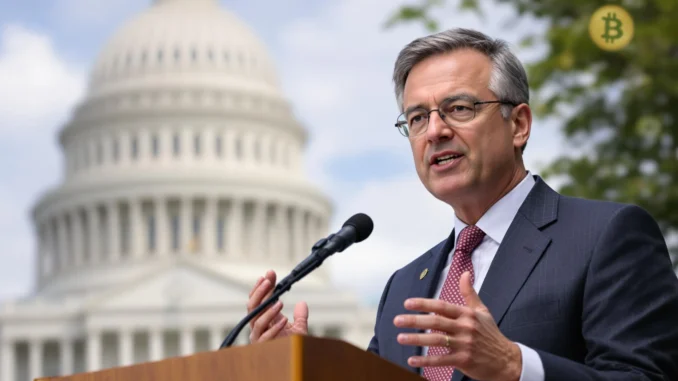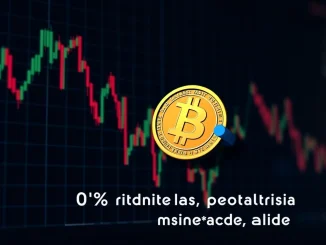
In a significant development for the cryptocurrency industry, Timothy Massad, a former chairman of the U.S. Commodity Futures Trading Commission (CFTC), has issued a compelling appeal to Congress. He’s urging lawmakers to make stablecoin legislation a top priority. This call to action, highlighted in a recent CoinDesk post, comes as the digital asset space grapples with regulatory uncertainty and seeks clear guidelines for future growth. But why is a former CFTC chair so insistent on focusing on stablecoins right now, and what does it mean for the broader crypto market?
Why Stablecoin Legislation Takes Center Stage?
Massad’s argument centers around the belief that establishing a robust legal framework for stablecoins is crucial before tackling the more complex task of regulating the entire digital asset market. He suggests that attempting to create overarching crypto regulation for all digital assets at this stage is premature and could lead to more confusion than clarity. His perspective is rooted in the potential for current legislative proposals to muddy the waters regarding the classification of digital assets as securities, commodities, or neither. Let’s break down his rationale:
- Clarity over Confusion: Massad believes that current legislative efforts risk creating more ambiguity in defining digital asset classifications. This uncertainty can stifle innovation and hinder market growth.
- Stablecoins First, Broader Market Later: He advocates for a phased approach, starting with the more pressing need for stablecoin legislation. Addressing stablecoins first allows for a more focused and effective regulatory framework.
- Foundation for Growth: Clear rules for stablecoins can provide a solid foundation for the broader digital asset market to mature and develop responsibly.
- Avoid Overreach: Trying to regulate everything at once might lead to overly broad and ineffective regulations that could stifle innovation and drive activity overseas.
Understanding the Role of the CFTC and Timothy Massad
For those unfamiliar, the CFTC (Commodity Futures Trading Commission) is an independent agency of the U.S. government that regulates the commodity futures and options markets. During the Obama administration, Timothy Massad served as its chairman, bringing a wealth of experience in financial markets and regulation to the role. His tenure at the CFTC provides him with a unique perspective on the challenges and opportunities presented by digital assets.
Massad’s call for prioritizing stablecoin legislation carries significant weight due to his background. Having led the CFTC, he understands the intricacies of financial regulation and the importance of a well-defined legal framework for emerging asset classes. His voice adds credibility to the growing chorus of industry experts and policymakers who recognize the urgency of addressing stablecoin regulation.
The Current Landscape of Crypto Regulation
The cryptocurrency industry currently operates in a patchwork of regulations across different jurisdictions. In the United States, various agencies, including the SEC (Securities and Exchange Commission) and the CFTC, are vying for regulatory oversight. This fragmented approach creates uncertainty and compliance challenges for businesses operating in the digital asset space.
Here’s a quick look at some key aspects of the current crypto regulation landscape:
| Area | Current Status | Challenges |
|---|---|---|
| Stablecoins | Regulatory clarity is still developing; various proposals are under discussion. | Defining stablecoin reserves, ensuring consumer protection, and addressing systemic risk. |
| Digital Asset Classifications | Ongoing debate about whether certain digital assets are securities, commodities, or something else. | Lack of clear definitions leads to inconsistent enforcement and uncertainty for businesses. |
| Enforcement Actions | Increased enforcement actions by agencies like the SEC and CFTC against crypto firms. | Can create a chilling effect on innovation and drive businesses away from the US. |
Why Focus on Stablecoins?
Stablecoins are a type of cryptocurrency designed to maintain a stable value, typically pegged to a fiat currency like the US dollar. They play a critical role in the crypto ecosystem, facilitating trading, lending, and payments. Their stability makes them attractive for everyday transactions and as a safe haven during market volatility.
The urgency surrounding stablecoin legislation stems from their growing importance and potential risks. Without proper regulation, stablecoins could pose risks to financial stability and consumer protection. Here’s why regulating stablecoins is so critical:
- Systemic Risk: Large-scale stablecoin failures could have ripple effects throughout the financial system, especially if they are not adequately backed by reserves.
- Consumer Protection: Users need assurance that stablecoins are indeed stable and that their funds are safe. Regulation can mandate transparency and reserve requirements to protect consumers.
- Payments Innovation: Stablecoins have the potential to revolutionize payments, offering faster, cheaper, and more efficient transactions. Clear regulation can foster innovation in this area.
- Bridge to Traditional Finance: Stablecoins act as a bridge between the traditional financial system and the crypto world, facilitating the flow of capital and adoption of digital assets.
The Path Forward for Stablecoin Legislation
So, what steps should Congress take to prioritize stablecoin legislation? Massad’s call to action highlights the need for a focused and pragmatic approach. Here are some key considerations for lawmakers:
- Focused Legislation: Craft legislation specifically tailored to stablecoins, addressing their unique characteristics and risks.
- Clarity on Reserves: Establish clear rules regarding stablecoin reserves, ensuring they are adequately backed by safe and liquid assets.
- Regulatory Framework: Define which agencies will have regulatory oversight over stablecoins and ensure coordination between them.
- International Cooperation: Engage in international discussions to harmonize stablecoin regulations globally.
- Foster Innovation: While regulating risks, ensure that legislation doesn’t stifle innovation in the stablecoin space.
Conclusion: A Crucial Moment for Crypto’s Future
Timothy Massad’s urgent plea for Congress to prioritize stablecoin legislation underscores a pivotal moment for the cryptocurrency industry. His experienced voice adds weight to the argument that focusing on stablecoins first is the most sensible path forward. By establishing a clear and robust regulatory framework for stablecoins, Congress can lay the groundwork for a more stable, innovative, and responsible digital asset ecosystem. Ignoring this call could lead to continued uncertainty, stifled innovation, and increased risks in the burgeoning world of cryptocurrency. The time for decisive action on stablecoins is now.



